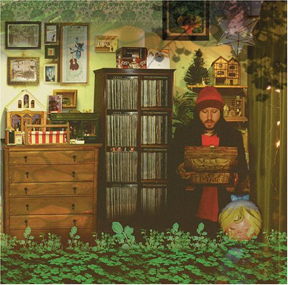 by: Sun-J
by: Sun-J
With his first release (on Mercury), The Hour of Bewilderbeast, Damon Gough (Badly Drawn Boy) grabbed the attention of many industry-heads, solidifying him several movie scores (only one of which he chose), and an extended label deal. The album was filled with pop-orchestration among the vintage Badly Drawn Boy sounds; acoustic piano and guitar.
The British born rocker's follow-up, Have you Fed the Fish? sounded quite similar to his first release, yet failed to garner mainstream respect. Jumping to new label, Astralwerks, Damon Gough returned back to London and hooked up with Twisted Nerve co-founder Andy Votel to record his third album. Badly Drawn Boy's first two albums were recorded in LA by pop enthusiast Tom Rothrock, and were heavily orchestrated. One Plus One Is One essentially trades in the pop orchestration for flute, eerily similar to that found on the Kill Bill soundtrack. Badly Drawn Boy's music can be described as ragged acoustic and piano, 1960's British Folk Rock with primary school flute. The album at times seems as if it were based of the Addams Family theme song with its powerful, authoritative and track dominating piano chords.
Gough opens up his third release with a title track. Softly strumming chords on an acoustic before gently singing subtle lyrics leading to a climatic line with a lagging band which enthusiastically jumps in at the finish; "As the past becomes the future, it gets clearer that it still boils down to peace, give me some peace..." "Easy Love" thrives on shuffled, Scottish influenced instrumentation controlled by a single guitar riff while Gough earnestly sings, "Never had an easy love, like the one I'm dreaming of, find the hand that fits the glove, of love..." The third track, "Summertime in Wintertime" is reminiscent of Jethro Tull with its electric guitar driven rock. "This is that New Song," begins with a harmonic quartet of strings before Gough lunges in with filtered vocals of empathy, "And if I knew the answers, I would tell you know, just what would be the chances, that I could show you how..." "Another Devil Dies" starts with a Phantom of the Opera premonition before jumping into an upbeat, Burt Bacharach piano. This song is an excellent example of Gough's keen ability to stretch the emotional limits of his audience. As a whole, the track has a smoke filled, lounge or bar feel to it. "The Blossoms" is a two minute, flute driven instrumental interlude perfectly preceding the enigma of "Year of the Rat." Upon a first read of the track, and considering Gough's British upbringing, I had guessed the song would glorify Everton's 1984 FA cup victory (with Kevin RATcliffe, the 'year of the rat'), but there was not mention of it whatsoever, subliminally or metaphorically. The next track, "Four Leaf Clover" is the standout track beginning with a rhythmic drum-kick pattern before establishing an acoustic guitar and settling in with a crooning bass and silky vocals over a melodic acoustic piano loop, "...come one, take it with you, you can pass it one, come on, you know I'm not the kind to say it's over..." "Fewer Words" utilizes classic guitar before juxtaposing with a jovial piano melody, counter intuitively supporting the thesis of the track. "Stockport" is another instrumental, this time piano driven while "Take the Glory" recursively points to "Summertime in Wintertime" with the lines, "Summer feels like its over, winter gets in the way, summer takes all the glory, blue skies turn into grey.." "Holy Grail" grows tiresome as it is virtually an eight plus minute instrumental track.
The closing track is an experimental Badly Drawn Boy track as Gough ventures into different sounds such as electric guitar and coarse, filtered vocals. Badly Drawn Boy will not gather enough momentum to propel him into the ever coveted mainstream flow, but does a superb job in sufficing listeners and fans with his trademark sound. The final track hints Gough may venture into different territory in the future, thankfully it doesn't sound too obscure. In closing, One Plus One Is One is an entertaining album and will keep Gough on pace to venture in other directions if he desires to do so.
Share
|
|

